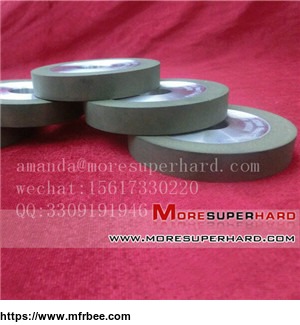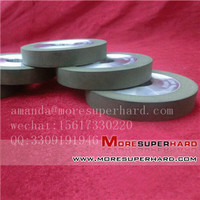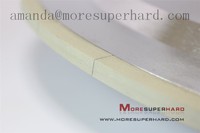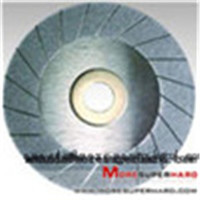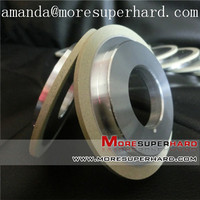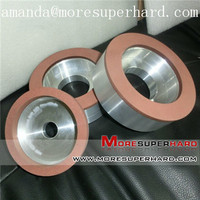Diamond Grinding Wheel for Cemented Carbide Tools
Product Quick Detail
- FOB Price
- USD $50.00 / Piece
- Minimum Order
- 1
- Place Of Origin
- China
- Packaging
- Depending on your requirements
- Delivery
- 7-15 work Days
Specifications
Resin Bond Wheels
Resin bond is usually made with heat-cured resin mainly composed of phenolic resin. Resin bond wheel has excellent grinding ability, surface finish and minimal chipping. It is widely applied for difficult-to-machine materials such as tungsten carbide, ceramics, glass, and silicon as well as ferrous materials such as high-speed steels and sintered ferrous metals.
(1)Characteristics of Resin Bond Wheels
1. Resin bond usually has some added filler such as organic and inorganic materials, metals, etc. into the phenolic resin in order to control its wear resistance, heat resistance, grit retention and lubrication.
2. Resin wheels are low in Young’s modulus, therefore they have excellent characteristics in: processing efficiency, free cutting, surface finish, and minimal chipping.
3. Resin bond wheels have shorter wheel life because the adhesion between the grit and the bond is not as strong as that of metal bond wheels. However, resin bond has much better cutting ability when processing hard-to-grind materials such as cermets, cermets, ceramics, etc.
4. The diamond and CBN abrasives used for resin bond wheels are different from those used for metal bond. They are irregular-shaped and easy to microfracture. By doing so, they also create new cutting edges constantly while grinding. In order to improve grit retention, the diamond is metal-coated and the surface is more uneven shaped.
5. Resin wheels are typically used for wet grinding, but they can be used for dry grinding by adding some filler to reduce heat generated by grinding and improving their cutting ability.
(2)Application of Diamond Wheels
1. Resin bond diamond wheels are mostly used for precision grinding of tungsten carbide, cermets and ceramics.
2. Because of the bond elasticity, they are used for finish grinding of silicon, glass, ceramic-made electrical parts, etc, which require excellent surface finish.
(3)Application of CBN Wheels
1. Resin bond wheels are suitable for grinding ferrous metals such as cast iron, high speed steels, and sintered iron.
2. They are suitable for processing hard to machine materials because CBN grains are much stronger than conventional abrasives.
3. They can perform precision grinding because they wear much less than conventional abrasives.
| Advantages: |
| 1. high-new technology |
| 2. High working efficiency; |
| 3. Amazing performance; |
| 4. Competitive price; |
| 5. Various types and sizes available; |
| 6. Considerate after-sell service. |
| 7. Manufacturer direct sell. |
Price
-
Price ConditionFOB
-
PriceUSD 45 / piece
amandaATmoresuperhard.com
Wechat:15617330220
Our company also produces a series of diamond and CBN tools, welcome to consult and choose at any time
- Contact: amanda zhou
